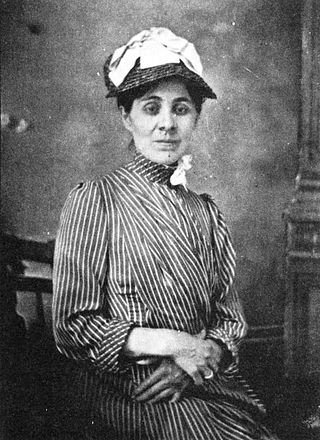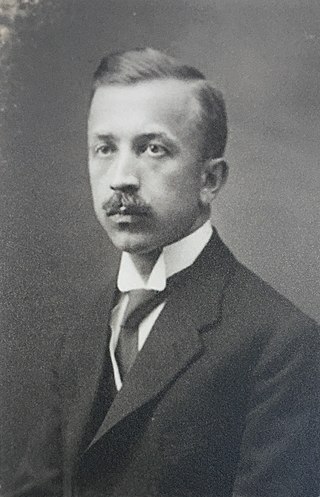Cornelis de Waal (May 30, 1962) is a Dutch Professor of American Philosophy at Indiana University. He is Editor-in-Chief of Transactions (the Charles S. Peirce Society). [1]
Cornelis de Waal (May 30, 1962) is a Dutch Professor of American Philosophy at Indiana University. He is Editor-in-Chief of Transactions (the Charles S. Peirce Society). [1]

Charles Sanders Peirce was an American scientist, mathematician, logician, and philosopher who is sometimes known as "the father of pragmatism". According to philosopher Paul Weiss, Peirce was "the most original and versatile of America's philosophers and America's greatest logician". Bertrand Russell wrote "he was one of the most original minds of the later nineteenth century and certainly the greatest American thinker ever".

In philosophy, empiricism is an epistemological view which holds that true knowledge or justification comes only or primarily from sensory experience. It is one of several competing views within epistemology, along with rationalism and skepticism. Empiricism emphasizes the central role of empirical evidence in the formation of ideas, rather than innate ideas or traditions. Empiricists may argue that traditions arise due to relations of previous sensory experiences.
Semiotics is the systematic study of sign processes and the communication of meaning. In semiotics, a sign is defined as anything that communicates intentional and unintentional meaning or feelings to the sign's interpreter.

Pragmatism is a philosophical tradition that views language and thought as tools for prediction, problem solving, and action, rather than describing, representing, or mirroring reality. Pragmatists contend that most philosophical topics—such as the nature of knowledge, language, concepts, meaning, belief, and science—are all best viewed in terms of their practical uses and successes.
Charles William Morris was an American philosopher and semiotician.

"Pragmaticism" is a term used by Charles Sanders Peirce for his pragmatic philosophy starting in 1905, in order to distance himself and it from pragmatism, the original name, which had been used in a manner he did not approve of in the "literary journals". Peirce in 1905 announced his coinage "pragmaticism", saying that it was "ugly enough to be safe from kidnappers". Today, outside of philosophy, "pragmatism" is often taken to refer to a compromise of aims or principles, even a ruthless search for mercenary advantage. Peirce gave other or more specific reasons for the distinction in a surviving draft letter that year and in later writings. Peirce's pragmatism, that is, pragmaticism, differed in Peirce's view from other pragmatisms by its commitments to the spirit of strict logic, the immutability of truth, the reality of infinity, and the difference between (1) actively willing to control thought, to doubt, to weigh reasons, and (2) willing not to exert the will, willing to believe. In his view his pragmatism is, strictly speaking, not itself a whole philosophy, but instead a general method for the clarification of ideas. He first publicly formulated his pragmatism as an aspect of scientific logic along with principles of statistics and modes of inference in his "Illustrations of the Logic of Science" series of articles in 1877-8.
Clarence Irving Lewis, usually cited as C. I. Lewis, was an American academic philosopher. He is considered the progenitor of modern modal logic and the founder of conceptual pragmatism. First a noted logician, he later branched into epistemology, and during the last 20 years of his life, he wrote much on ethics. The New York Times memorialized him as "a leading authority on symbolic logic and on the philosophic concepts of knowledge and value." He was the first to coin the term "Qualia" as it is used today in philosophy, linguistics, and cognitive sciences.
A pragmatic theory of truth is a theory of truth within the philosophies of pragmatism and pragmaticism. Pragmatic theories of truth were first posited by Charles Sanders Peirce, William James, and John Dewey. The common features of these theories are a reliance on the pragmatic maxim as a means of clarifying the meanings of difficult concepts such as truth; and an emphasis on the fact that belief, certainty, knowledge, or truth is the result of an inquiry.
Neopragmatism, sometimes called post-Deweyan pragmatism, linguistic pragmatism, or analytic pragmatism, is the philosophical tradition that infers that the meaning of words is a result of how they are used, rather than the objects they represent.
Roberta "Bobbie" Kevelson was an American academic and semiotician. She was an acknowledged authority on the pragmatism theories of Charles Sanders Peirce.

This Charles Sanders Peirce bibliography consolidates numerous references to the writings of Charles Sanders Peirce, including letters, manuscripts, publications, and Nachlass. For an extensive chronological list of Peirce's works, see the Chronologische Übersicht on the Schriften (Writings) page for Charles Sanders Peirce.

The Teza is a river in Ivanovo Oblast, Russia. It is a left tributary of the Klyazma, which is in turn a tributary of the Oka. It has a length of 192 kilometers and a drainage basin with an area of 3,450 square kilometers. Annual flooding occurs between April and the middle of May. It is under ice starting some time between the beginning of November to the beginning of December until some time in April. The city of Shuya is located on the Teza.

Juliette Peirce was the second wife of the mathematician and philosopher Charles Sanders Peirce.

Joseph Zalman Margolis was an American philosopher. A radical historicist, he authored many books critical of the central assumptions of Western philosophy, and elaborated a robust form of relativism.

The pragmatic maxim, also known as the maxim of pragmatism or the maxim of pragmaticism, is a maxim of logic formulated by Charles Sanders Peirce. Serving as a normative recommendation or a regulative principle in the normative science of logic, its function is to guide the conduct of thought toward the achievement of its purpose, advising on an optimal way of "attaining clearness of apprehension". Here is its original 1878 statement in English when it was not yet named:
It appears, then, that the rule for attaining the third grade of clearness of apprehension is as follows: Consider what effects, that might conceivably have practical bearings, we conceive the object of our conception to have. Then, our conception of these effects is the whole of our conception of the object.
Vincent Colapietro is a Liberal Arts Research Professor in the Department of Philosophy at Pennsylvania State University. His education includes a bachelor's degree from Saint Anselm College, a master's degree from Marquette University and a Ph.D. from Marquette University. While his principal area of historical research is classical American pragmatism, he has wide and varied scholarly interests. They range from such literature, film, and music to semiotics, poststructuralism, and psychoanalysis, from social and political philosophy to philosophical and experimental psychology. He is the author of Peirce’s Approach to the Self, A Glossary of Semiotics, and Fateful Shapes of Human Freedom as well as scores of articles. The main focus of his current research is the intersections between pragmatism and psychoanalysis. His writings have been translated into a variety of languages, including French, Italian, Portuguese, Russian, Bulgarian, and Japanese. Chair of the Advisory Board of the Peirce Edition Project. Co-editor of the Journal of Speculative Philosophy. He is past president of the Metaphysical Society of America, the Semiotic Society of America, and the Charles S. Peirce Society.
The Peirce Geodetic Monument is a marker honoring the late American philosopher Charles Sanders Peirce. It is located on Indiana University-Purdue University Indianapolis (IUPUI) campus in downtown Indianapolis, Indiana, and was installed by the National Oceanic and Atmospheric Administration and the U.S. National Geodetic Survey.

Charles Santiago Sanders Peirce was the adopted name of Charles Sanders Peirce, an American philosopher, logician, mathematician, and scientist. Peirce's name appeared in print as "Charles Santiago Peirce" as early as 1890. Starting in 1906 he used "Santiago" in many of his own articles. There is no well-documented explanation of why Peirce adopted the middle name "Santiago" but speculations and beliefs of contemporaries and scholars focused on his gratitude to his old friend William James and more recently on Peirce's second wife Juliette.

Ivan Sarailiev was a Bulgarian philosopher related to the school of pragmatism.; he finished his major book Pragmatism in 1938 quoting from Charles Sanders Peirce’s Collected Papers. Sarailiev was the first pragmatist in Eastern Europe and also a "very early pragmatist". He also introduced the idea of implied reader in his reception theory as early as in Savremennata nauka y religiata (1931).
Cheryl J. Misak is a Canadian philosopher who works in pragmatism, the history of analytic philosophy, and bioethics. She is a University Professor at the University of Toronto, a Fellow of the Royal Society of Canada, and a recipient of a Guggenheim Fellowship in intellectual and cultural history. In 2011, Misak served as president of the Charles S. Peirce Society. In December 2020, Misak became the interim director of the Munk School of Global Affairs at the University of Toronto.